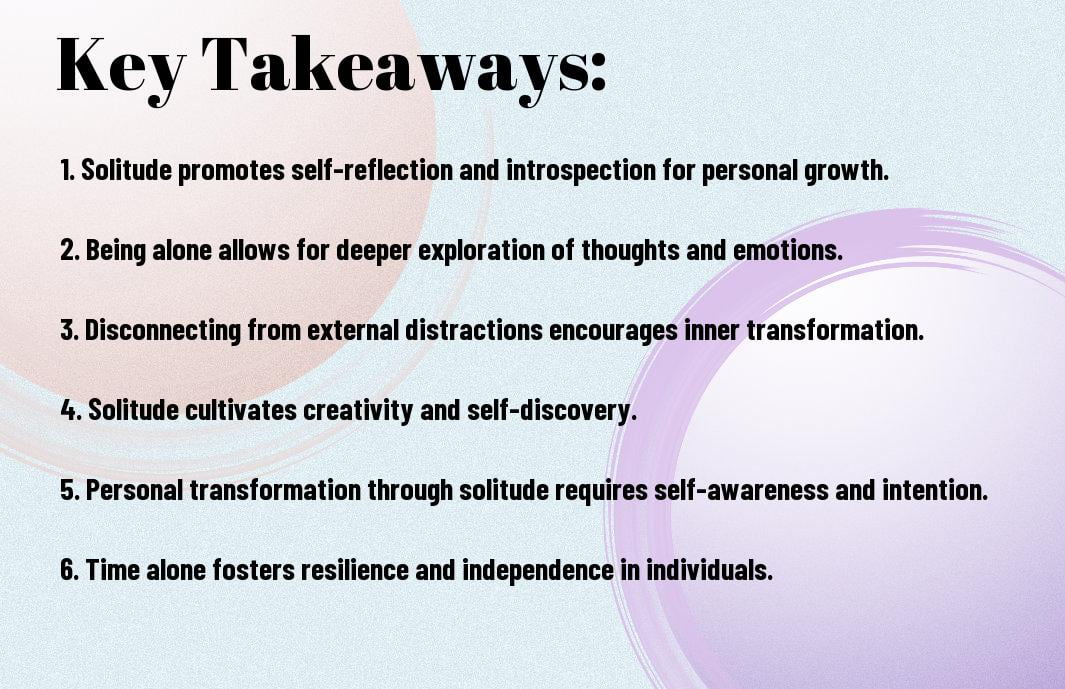#Transformation can often be a result of solitude. In a world filled with constant noise and distractions, the act of being alone can foster personal growth and deep reflection. Solitude offers a unique opportunity to explore into one’s thoughts, feelings, and desires, leading to self-discovery and personal transformation. By embracing solitude, individuals can unlock their true potential and initiate on a journey of self-improvement.
Key Takeaways:
- Solitude as a Catalyst: Solitude can serve as a powerful catalyst for personal transformation by providing the space for self-reflection, growth, and introspection.
- Clarity and Self-Discovery: Being alone allows individuals to gain clarity on their values, beliefs, and goals, fostering self-discovery and a deeper understanding of oneself.
- Embracing Change: Embracing solitude can lead to personal transformation as it enables individuals to confront their fears, insecurities, and uncertainties, ultimately paving the way for growth and positive change.

Understanding Solitude
Definition and Different Types
To understand the concept of solitude better, it is vital to grasp its definition and the various types it can manifest in. Solitude is the state of being alone or isolated from others, allowing for introspection and self-discovery. There are different types of solitude, ranging from physical solitude, where a person is physically alone, to emotional solitude, where one may feel emotionally isolated even in a crowd. Assume that each type of solitude offers unique opportunities for personal growth and transformation.
| Physical Solitude | Emotional Solitude |
| Solitude experienced in a physical setting. | Feeling emotionally isolated or disconnected from others. |
| Social Solitude | Intellectual Solitude |
| Choosing to be alone to recharge from social interactions. | Engaging in solitary activities to stimulate intellectual growth. |
| Creative Solitude | Spiritual Solitude |
| Solitude that fosters creative inspiration and innovation. | Seeking solitude for spiritual reflection and connection. |
Psychological Perspectives on Being Alone
Perspectives on being alone from a psychological standpoint probe into the impact of solitude on an individual’s mental well-being. Psychologists often view solitude as a critical component of self-care and personal development. While excessive isolation can lead to feelings of loneliness and social withdrawal, moderate solitude can promote introspection, creativity, and emotional resilience. Assume that striking a balance between solitude and social interactions is key to harnessing its transformative power.
The Role of Solitude in Personal Transformation
Solitude for Self-Reflection
While surrounded by the noise and distractions of everyday life, it can be challenging to engage in deep self-reflection. Solitude provides a peaceful and uninterrupted environment for introspection, allowing individuals to examine their thoughts, beliefs, and behaviors with clarity.
Solitude as a Space for Emotional Healing
Role
To foster personal transformation, solitude serves as a space for emotional healing. In moments of solitude, individuals can confront and process their emotions without external influences. This introspective practice can lead to deep emotional understanding, acceptance, and healing, paving the way for personal growth and transformation.
Challenges and Considerations
Many people who have mastered the power of solitude display certain traits that contribute to personal transformation. However, there are challenges and misconceptions to be aware of when embracing solitude as a means of self-discovery.
Common Misconceptions About Solitude
An important misconception about solitude is that it equates to loneliness or isolation. However, solitude is a deliberate choice to spend time alone for reflection and personal growth, contrasting with feelings of loneliness which are often unwanted and involuntary.
Navigating the Challenges of Solitary Time
Challenges may arise when individuals are unaccustomed to being alone with their thoughts or emotions, leading to discomfort or unease. For instance, facing unresolved issues or uncomfortable truths during solitary time can be daunting and may require courage to confront and process.

Final Words
Now that we have explored the ways in which solitude can foster personal transformation, it is evident that spending time alone allows for self-reflection, self-discovery, and personal growth. Embracing solitude can provide individuals with the opportunity to gain deeper insights into themselves and their lives, leading to transformative changes in their perspectives, beliefs, and behaviors. Ultimately, solitude can be a powerful tool for personal development and self-improvement.
FAQ
Q: Can solitude foster personal transformation?
A: Solitude can indeed foster personal transformation. When we are alone, we have the space and time to reflect on our thoughts, emotions, and experiences. This introspection can lead to greater self-awareness, insight, and personal growth. Solitude provides an opportunity to connect with our inner selves, clarify our values and goals, and cultivate a deeper understanding of who we are and what we want in life.
Q: How can solitude benefit personal development?
A: Solitude can benefit personal development in various ways. It allows individuals to recharge and rejuvenate, reducing stress and promoting mental well-being. Being alone also encourages creativity, as it provides a peaceful environment for reflection and ideation. Solitude can help individuals develop a sense of independence and self-reliance, fostering resilience and confidence. Additionally, spending time in solitude can enhance focus, productivity, and decision-making skills.
Q: Are there any potential challenges associated with solitude as a means of personal transformation?
A: While solitude can be a powerful tool for personal transformation, it is crucial to approach it mindfully. Excessive isolation or withdrawing from social interactions completely can lead to feelings of loneliness, depression, and disconnectedness. It is crucial to strike a balance between solitude and social engagement to ensure holistic personal growth. Additionally, prolonged isolation may hinder social skills development and communication abilities. It is important to practice self-care, maintain meaningful relationships, and seek support when needed while embracing solitude as a source of personal transformation.




